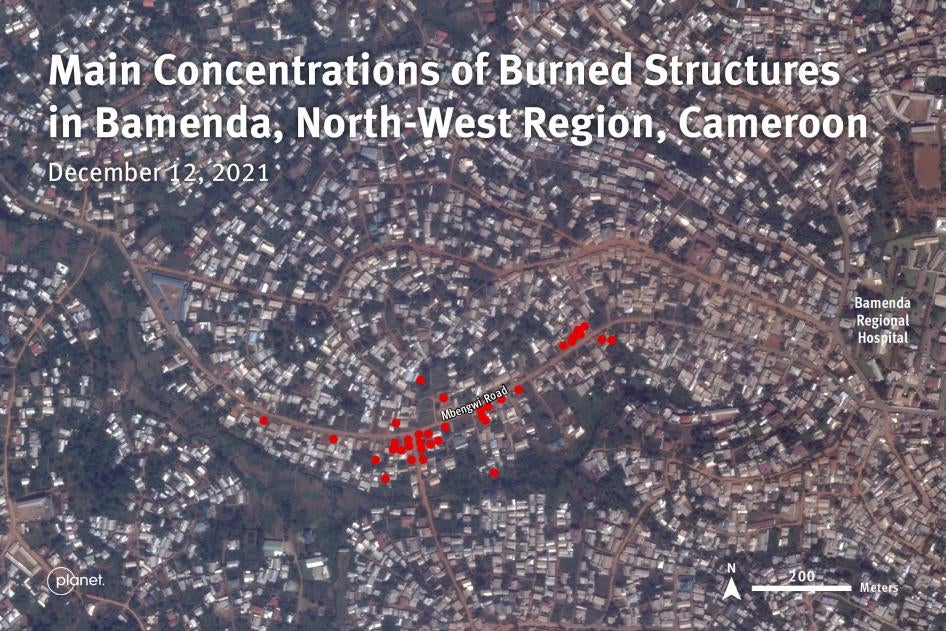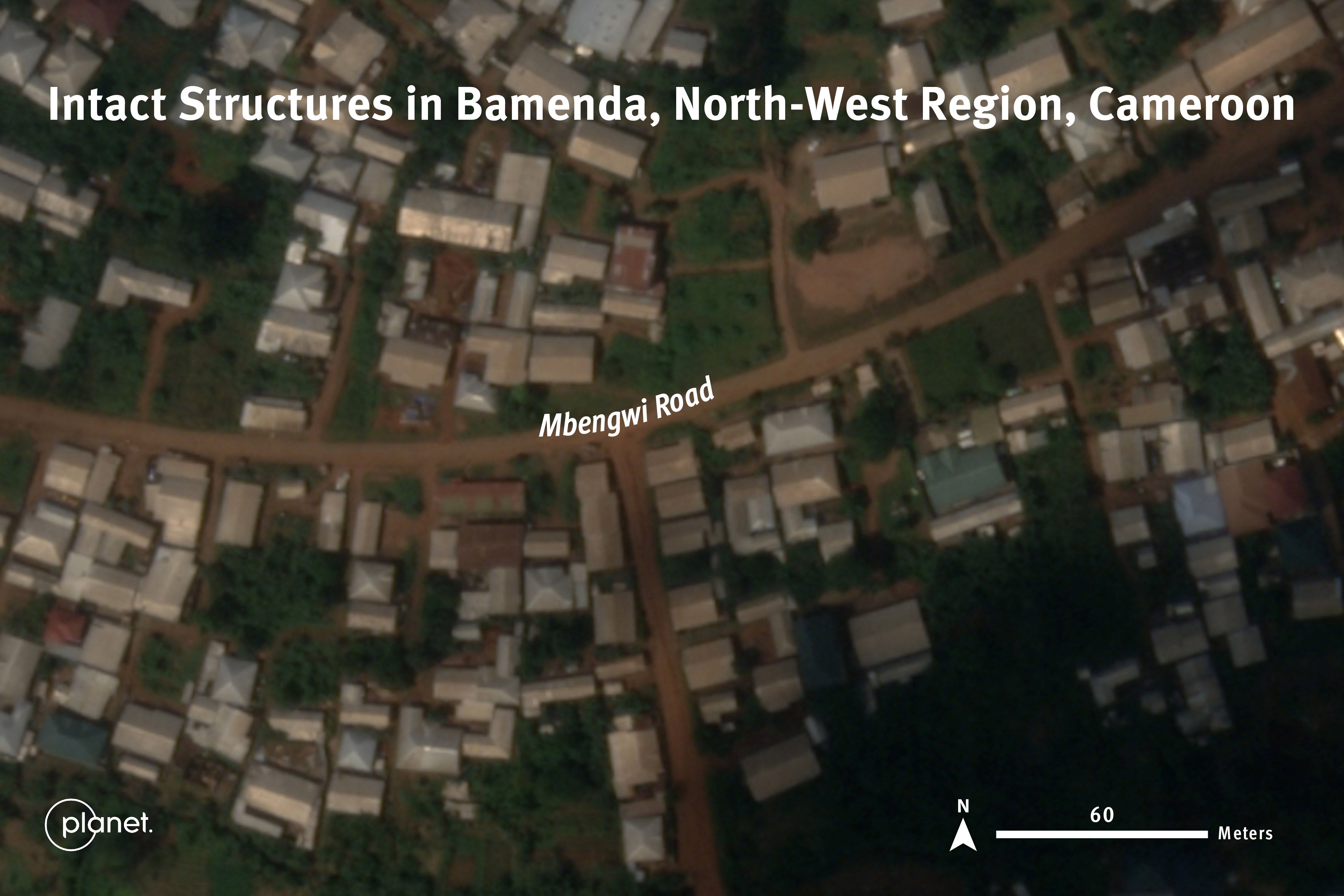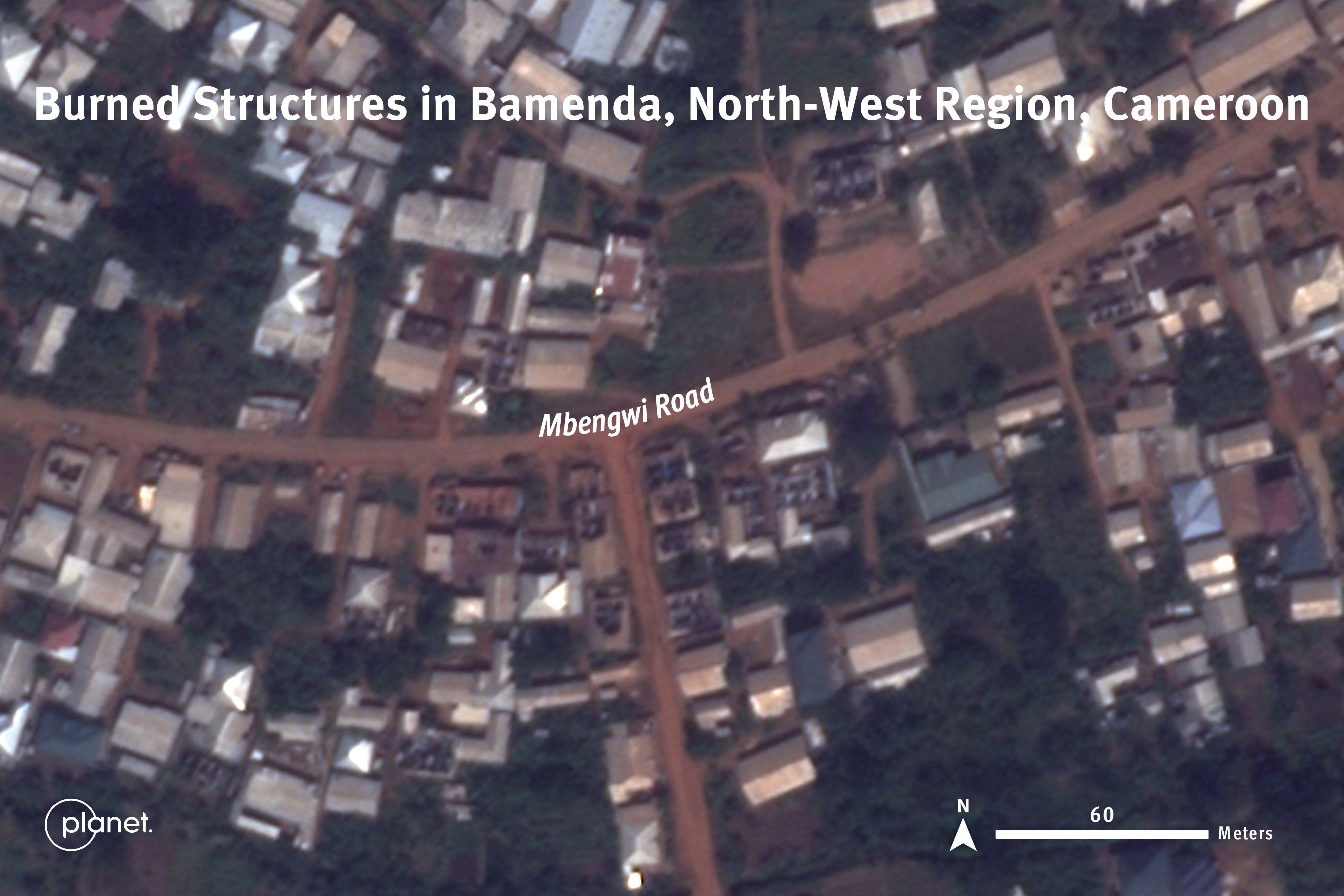(Nairobi) – Cameroonian soldiers killed at least eight people and burned down dozens of homes and shops during three separate military operations in the North-West English-speaking region in December 2021, Human Rights Watch said today. The dead included three children, two women, and an older man.
“Cameroon’s security forces have again shown disregard for human life during their recent operations in the North-West region,” said Ilaria Allegrozzi, senior Africa researcher at Human Rights Watch. “The killings of civilians, including children, are serious crimes that should be credibly and independently investigated, and those responsible held to account.”
On December 8, 2021, in response to an attack on a military convoy by armed separatist fighters, soldiers killed two teenage boys, ages 16 and 17, and a 70-year-old man, and burned at least 35 private homes and shops along Mbengwi Road in Bamenda, the capital city of the North-West region.
On December 10, soldiers from the elite Rapid Intervention Battalion (Battaillon d’intervention rapide, BIR) searched door-to-door in Chomba village, about 10 kilometers from Bamenda in a separatist-held area. The soldiers gathered about 80 residents in the village square, accused them of harboring separatist fighters, and threatened them with death. The soldiers forcibly disappeared four villagers, two of them women, during the raid. They were found dead on December 29, with apparent gunshot wounds to their heads.
On December 22, soldiers shot and killed a 3-year-old girl and injured a 17-year-old girl in Bamenda’s Ngomgham neighborhood, following an alleged attack earlier that day by armed separatist fighters.
Between December 19 and January 12, 2022, Human Rights Watch interviewed by telephone 19 people, including seven witnesses to the arson attack on Mbengwi Road, who also lost their property; four witnesses to the military operation in Chomba, and two medical workers at Bamenda’s regional hospital where the bodies of the two teenage boys were deposited and where the 70-year-old man was treated and died. Human Rights Watch also interviewed two relatives of the girl killed and the 17-year-old girl injured in Ngomgham neighborhood, a local journalist who investigated that attack, and three residents of the North-West region with knowledge of the three incidents.
Human Rights Watch also reviewed satellite imagery showing over 35 buildings affected by fire along Mbengwi Road and 19 videos shared directly with Human Rights Watch researchers and posted on social media platforms indicating extensive destruction of property there. Human Rights Watch reviewed hospital bills and two photographs of the 17-year-old girl and a video showing the bodies of the four people found in Chomba and three photographs of their burial.
On January 21, Human Rights Watch shared its findings with the army spokesperson, Col. Cyrille Serge Atonfack Guemo, requesting responses to specific questions. Guemo did not reply.
In a news release on December 10, the Cameroonian Ministry of Defence claimed that separatist fighters ambushed a BIR unit with an improvised explosive device on December 8 in Bamenda’s Nitop neighborhood and that a confrontation between the soldiers and the separatists ensued. The spokesperson for the ministry denied that security forces torched any homes or shops, claiming instead that a separatist warehouse storing “components used in making improvised explosive devices” exploded “during the gun battle,” causing “a shock wave on a few nearby houses.” He also said that an investigation had been opened into “the unfortunate incident.”
Human Rights Watch analysis of satellite imagery recorded before and after the reported arson attack indicates that at least 35 structures were damaged by fire, some of which appear to have been completely reduced to ash while others appear to have burn scars on their roofs. The burned structures are along both sides of Mbengwi Road, showing distinct damaged areas. This pattern suggests that distinct fires were set in individual structures and that the damage was not the result of the expansion of a larger fire or explosion as the Ministry of Defence claimed. Human Rights Watch also believes its analysis of the damage is most likely an underestimate as the satellite imagery does not show internal damage to buildings.
“I lost my entire house, and I am now homeless,” a 55-year-old trader who lived on Mbengwi Road told Human Rights Watch. “I saw up to 30 soldiers, including from the BIR. They were shooting and burning. In my home, everything was burned: all the kitchen stuff, books, mattresses, chairs, tables, clothes, bed sheets, blankets. They burned room by room.”
National and international media outlets as well as Cameroonian and international human rights organizations reported the arson attack on Mbengwi Road. In a December 10 joint report, the Centre for Human Rights and Democracy in Africa, a Cameroonian rights group, and the Database of Atrocities, a research project led by volunteers and researchers from several international universities, documented the widespread burning of buildings along Mbengwi Road on December 8 by government forces. This report referenced several videos shared on social media showing burning buildings, the locations of which were identified and shared online by researcher Israel Ayongwa. The report also stated that a witness “saw the corpses of two boys at a burned metal workshop.”
The incidents in December follow previous spates of violence and human rights violations by government forces during the crisis in the Anglophone regions, most of which have gone unpunished. Human Rights Watch has documented extensive burning of villages by members of the security forces between 2017 and 2021 in both the North-West and South-West English-speaking regions, as well as killings and mistreatment of civilians. Armed separatist groups have also committed abuses, including killings, kidnappings, and widespread attacks on education.
On December 5, the African Commission on Human and Peoples’ Rights issued a resolution expressing “concern about the deteriorating human rights situation” in Cameroon and calling on the government to “authorize a fact-finding mission into the country, to enable the Commission [to] ascertain the violations alleged.”
“The Cameroonian government’s failure to hold its security forces to account for past abuses has only encouraged soldiers to commit further heinous crimes,” Allegrozzi said. “To stop this impunity and help pave the way for justice, the government should facilitate full access and cooperation to allow independent experts from the African Commission on Human and Peoples’ Rights to investigate the alleged crimes.”
For more details on recent abuses and accounts from victims and witnesses, please see below.
Military Attack Along Bamenda’s Mbengwi Road (December 8, 2021)
Killings
During the attack, soldiers killed three people, including two teenage boys, ages 16 and 17, who were working as apprentices in a welder workshop, and an older man who lived on Mbengwi Road. . Human Rights Watch did not interview any witnesses to the killings but spoke with five people who saw their bodies and with two medical sources at the Bamenda regional hospital who confirmed that the boys’ bodies were taken to the hospital’s mortuary and that a 70-year-old man was treated and died there on December 10.
A 45-year-old truck driver who rescued the older man and took him to the hospital said:
The soldiers burned my home and shot my tenant, a 70-year-old man. He didn’t die on the spot. I found him outside my home, bleeding. He had been shot in the right leg. I took him to the regional hospital; he died two days later. He could not escape because of his age. He was too old and weak and could not.
Human Rights Watch reviewed two videos sent directly to its researchers and posted to social media platforms, whose authenticity was confirmed by the truck driver and another resident of Mbengwi road, showing the 70-year-old man on the ground after he was shot. In the video, the man’s right trouser leg is cut open with his injured leg exposed, consistent with injuries witnesses described.
A 44-year-old man whose home was burned during the attack said he saw the bodies of the two children. “They were apprentices at the welder workshop in front of my home,” he said. “Their bodies were partially burned. So, it was difficult to determine where they had been shot. The bodies were taken to the mortuary of the Bamenda regional hospital.”
Burning of Property
A 34-year-old woman, whose home and food shop were burned by soldiers, said:
I was in my shop when the soldiers started coming at around 4 p.m. I heard shooting. I saw more than 20 soldiers on foot. They were shooting at random and burning everything along their way. I decided to escape. I ran as fast as I could and hid in a nearby home. I was worried because my two children, 7 and 5 years old, were at home. Then, I sought shelter at my aunt’s home.
The following day, when I went back to Mbengwi road, I found that my shop had been completely burned and my home partially burned. I managed to reunite with my children, and they told me that the military set the room on fire while they were still inside. Neighbors rescued them. I can’t believe my children could have been burned alive.
The Human Rights Watch analysis of lower resolution satellite images is consistent with witness accounts regarding the date and time of the fires. A satellite image recorded on December 8, 2021, at 10:39 a.m. (local time) shows no signs of damage, but 24 hours later, multiple buildings were affected by fire.
A woman whose nail salon was burned during the attack said:
The military came and burned my shop down. It was my only source of income. I was in the shop with my 5-year-old child when the soldiers came and set it on fire. One of them said: ‘Shoot them!’ But another said: ‘Let them go.’ So, we ran. And then they burned the shop. My child has been traumatized since. I lost everything I had – about 1 million CFA [US$1,725].
A 45-year-old man whose home and shop were burned said:
My four-room house, with everything inside, and my shop, where I used to sell food and drinks, are gone. The military burned them. I was outside my home when they [the soldiers] came. My wife and eight children were inside the house. The soldiers came on foot and shot around randomly, setting buildings along the road on fire. I had to run away with my family. I lost all I had. I estimate my losses at 15 million CFA [US$25,880]. We now live with a relative.
Beatings
Soldiers also beat the truck driver, he said:
When a friend called me to inform me that my home was on fire, I rushed there, but I was stopped by soldiers along the way. I could see smoke and flames coming from my house. The soldiers dragged me by the roadside, ordered me to lay on the ground, and then they beat me and kicked me. They wanted to know who planted the bomb [which was used to ambush soldiers]. They said I should tell them where the amba [separatist fighters] were hiding.
Military Operation in Chomba Village (December 10, 2021)
According to four witnesses, at least 50 BIR soldiers cordoned off Chomba village as early as 7 a.m. on December 10. They searched door-to-door, stealing items and money from villagers and forcing some of them out of their homes. They gathered at least 80 villagers, including women and children, at the village square and kept them there until at least 4 p.m. They issued death threats, beat some people, and burned a home.
A pastor who was among those assembled at the village square said:
Five BIR soldiers broke into my home. They searched all the rooms, including the toilets and the kitchen. They said they were looking for ‘Amba boys’ [separatist fighters]. I was ordered to join other villagers that they had removed from their homes and were gathered at the village square. Some soldiers were guarding us there; others were entering every compound, breaking doors, taking away valuables and money. They set fire to one of the houses where they claimed they had found a gun. At the village square, they threatened to kill all of us. One soldier told me to lie prostrate on the ground, the reason being that I was carefully observing his moves.
A 57-year-old businessman said:
I was driving with my wife, my two children, and another passenger when BIR soldiers stopped my car, ordered us to get out, told me to drive back to Chomba and forced my family to walk back. They took us to the village square, where they had assembled about 80 people, including women and children. We sat there under the sun until the military left. They threatened to kill us; they accused us of being amba [separatist fighters]. They beat some people in front of me on their heads. At one point, they ordered us to face the wall of a house. Everybody turned towards the wall crying. People thought they would be executed.
Witnesses said that armed separatists operate in Chomba and the surrounding areas. Capo Daniel, the deputy chief of staff of the Ambazonia Defense Forces (ADF), a major separatist group, described Chomba to Human Rights Watch as “an ADF stronghold.” All witnesses confirmed, however, that there was no confrontation between the security forces and the separatists on December 10, and that the separatists fled when security forces arrived: “There was no clash between the soldiers and the amba [separatist fighters],” the 57-year-old businessman said. “Amba pass by Chomba, but this doesn’t make us, the villagers, amba. But that’s what the military say. They punished us.”
Enforced Disappearances and Killings
Witnesses said that, at the end of the military operation, on the evening of December 10, they noticed that four villagers – a man with his wife, another woman, and another man – were unaccounted for. They said the entire community looked for the four people, including in police and gendarmerie stations in the nearby city of Bamenda, without finding them.
A lawyer said that he went to a gendarmerie post in Bamenda on December 14 to inquire about them: “The gendarme officer told me they were not in their cells.” The same lawyer said that one of his colleagues, also a lawyer, filed a complaint to the North-West region’s attorney general, requesting information about two of the disappeared people, and that the complaint was transferred to the gendarmerie for investigation. Human Rights Watch has not been able to see a copy of the complaint.
If a person is deprived of their liberty by state agents, and their detention is not acknowledged or details of their whereabouts or fate are concealed, this constitutes an enforced disappearance, strictly prohibited under international law. Governments are obligated to investigate any allegation of enforced disappearance and punish those responsible appropriately.
A 61-year-old man and a relative of three of the disappeared people said that during the military operation in Chomba, he saw soldiers entering the home where the forcibly disappeared people were allegedly taken from, and that he later heard gunshots: “I saw the BIR approaching the house. They asked me: ‘What are you doing here?’ I replied that I was the neighbor. They said I should immediately go back home and lock my door. Which I did. Then, I heard gunshots.”
A 46-year-old driver and relative of three of the victims said that the 7-year-old child of one of the couples came to his home in the evening of December 10, saying that soldiers had taken away his parents.
Witnesses said that a Chomba resident found the bodies on December 29 in an abandoned home in Chomba in an advanced state of decomposition and with signs of gunshot wounds to their heads. He alerted the community. Human Rights Watch reviewed a video sent directly to its researchers and posted online, whose authenticity was confirmed by the four witnesses, showing the bodies when they were discovered, as well as three photographs showing their burial.
“I went there and brought plastic bags to wrap the bodies,” the 46-year-old driver said. “I identified the people killed and noticed they had also been shot in the heads. With the help of others, I buried them in Chomba.”
Attack in Bamenda’s Ngomgham Neighborhood (December 22, 2021)
On December 22, between 10:30 and 11 a.m., soldiers on patrol at Cowboy junction, in Bamenda’s Ngomgham neighborhood, shot two children, killing the 3-year-old girl and injuring the 17-year-old girl.
A relative of the victims, who spoke with the injured survivor, said that the girls were passengers on a motorbike when the military shot them: “They shot the 3-year-old girl in the ribs, and she died on the spot; the elder one was shot in the left arm. The motorbike driver ran off.”
Two relatives said the 17-year-old girl was taken to Bamenda’s St. Mary hospital after the shooting, where she underwent surgery to remove the bullet from her left arm. Human Rights Watch reviewed two photographs showing her on a hospital bed with her arm wrapped bandages, as well as the bills sent by the hospital to the girl’s family. The girl was discharged on December 31, a relative said.
The 3-year-old girl was buried on December 24 in Menka village, North-West region. Local media and the UK high commissioner in Cameroon reported that a second girl was killed on December 22, also in Ngomgham neighborhood, but Human Rights Watch was unable to verify the information.
In a December 22 video statement, Capo Daniel, ADF’s deputy chief of staff, stated that the killing and injuring of the two girls in Ngomgham followed an attack, earlier on the same day, by ADF fighters on the Cameroonian military in the area and that the soldiers retaliated by killing civilians. However, Human Rights Watch was unable to confirm this information.










